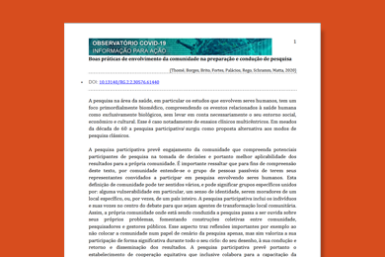
This paper presents various suggestions of good practices regarding community engagement in the preparation and execution of research. This includes the balance between research protocols and local interests; inclusive decision-making; the dialogue when coming up with guidelines and recommendations related to the research topic, which should be accessible and adapted according to social, economic, cultural, and health aspects of groups and individuals; the participation of communities that are not related to criteria of geographic location, such as groups of patients, people who are vulnerable to infection or worse prognosis, or people affected by particular diseases; the establishment of evaluation and discussion strategies among those involved in the process, results, and consequences of the research in the post-epidemic context, in order to identify issues, gaps in knowledge, communication, information, among others.